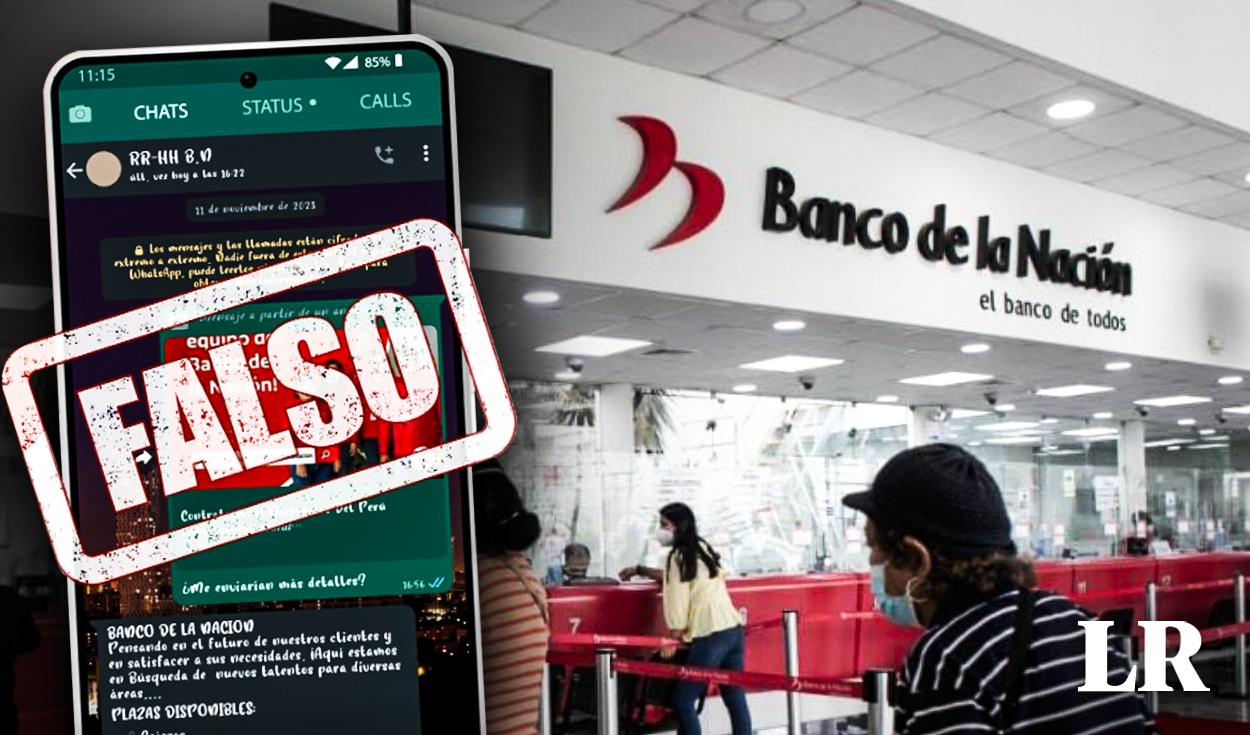
Have you ever heard of spoofing or fishing? Did you receive a message or email with fraudulent job offers? If you encountered these unpleasant situations, you have to be alert because the Banco de la Nación has identified new types of scams that seek to obtain your confidential information to commit crimes.
To avoid being a victim of these acts for criminal purposes, the bank’s fraud prevention manager, Luis García, explained the various strategies used by these unscrupulous people and provided some recommendations to safeguard the financial security of citizens. Pay attention and take note!
Banco de la Nación warns about new types of scam: what are they?
During an interview on Panamericana Televisión, the fraud prevention manager of the Banco de la Nación, Luis García, explained that one of the scam methods used by these criminals is telephone spoofing: the criminals pretend to be officials of the banking entity to obtain the personal data of their victims such as passwords, bank accounts and others that they need to commit their misdeeds.
“It is a phenomenon of social engineering that consists of criminals taking our telephone number into account. They call our clients from there and pose as officials to obtain their personal information in an illicit way that allows them to carry out unusual operations,” he indicated.
Likewise, he mentioned that there are other deception strategies such as phishing: this occurs through the sending of links in emails that impersonate the identity of companies or public organizations and request personal and banking information from the user. These communications usually include the entity’s logo or brand image and attempt to convey urgency and fear so that the user accelerates their actions.
“Within phishing, we have its variants such as pharming. That is, the planting of malicious software on devices such as computers and mobile phones, which what they do is obtain financial information in a hidden way. Another is smishing, which is the sending of text messages, where they offer work, bonuses, money, withholdings. They send a link to capture financial information,” he added.
How to identify these new types of scam, according to the Banco de la Nación?
According to García, cybercriminals usually contact the telephone numbers of Banco de la Nación clients to surprise them and ask for information that should not be shared. In this situation, it is recommended to identify if your requirements are related to the following:
- Card number
- Security code
- Date of Expiry
- Card secret key
- Cashier’s secret key
- Banking transactions.
If this situation occurs, it is preferable not to open messages or answer alleged calls from Banco de la Nación. It must be taken into account that job calls are made through its official channels and its transparency portal. Furthermore, let us remember that the banking entity does not in any case request payment for any certification or conduct raffles.
How to avoid spoofing, according to the Banco de la Nación?
- Banco de la Nación does not request confidential information from its clients (balances, username and password, secret codes, codes sent to the client’s cell phone, card numbers, expiration date or the three digits for online purchases, etc.) through phone calls and not through any other means such as text messages, email, etc.
- If a call with these characteristics is identified, the recommendation is to hang up immediately, since it is a fraud attempt.
- If you have received a communication of this type, it is likely that your confidential information is compromised, therefore, it is recommended to block your cards, monitor your balances, modify the secret code of your cards and other actions that secure your money.
- Never share personal information, balances, physical token keys or codes you receive via SMS (short message service) messages under any circumstances. These security elements are only generated to confirm financial operations and/or update your personal data.
Banco de la Nación: what are its official accounts?
- Transparency portal of the Banco de la Nación: https://www.bn.com.pe/transparenciabn/transparencia.asp
- Facebook: https://www.facebook.com/BancoDeLaNacion
- Twitter: https://twitter.com/BancodelaNacion
- Instagram: https://www.instagram.com/bancodelanacionperu/
- YouTube: https://www.youtube.com/@BNPeru/
- Tiktok: https://www.tiktok.com/@bancodelanacionperu
- LinkedIn: https://www.linkedin.com/company/bancodelanacionperu/.
Source: Larepublica
Alia is a professional author and journalist, working at 247 news agency. She writes on various topics from economy news to general interest pieces, providing readers with relevant and informative content. With years of experience, she brings a unique perspective and in-depth analysis to her work.












